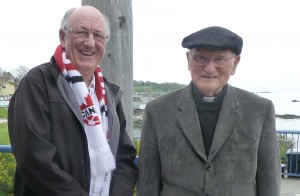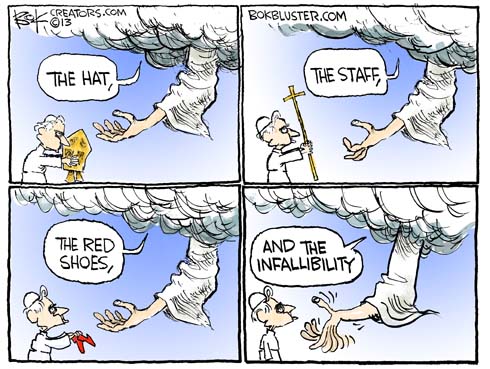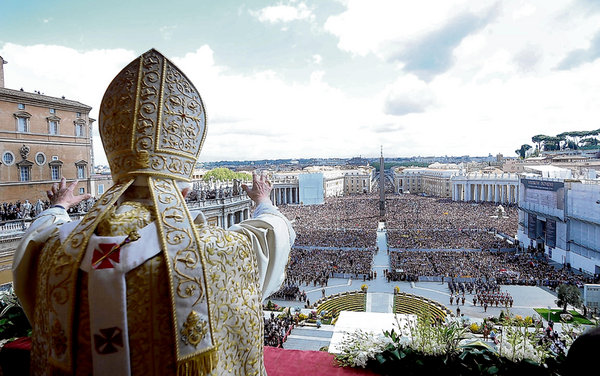Papal Infallibility
Papal Infallibility: A Cornerstone of the Catholic Church
As a one time practicing Catholic (1), I have always been troubled by the ever changing positions taken by the Church. A large part of this stems from the churches concept of Papal Infallibility (2). It struck me that this concept tended to place the God (the Catholic God at least) in a very negative light as He was constantly changing his (or her) mind on key subjects held near and dear to church teachings.
Over the past 50 years, I have heard pronouncements from various Popes that, to be charitable, are all over the map on a number of “hot button” issues. Most recently, Pope Francis has taken a much more inclusive stance toward gays and lesbians, same-sex marriages, transgender individuals, abortion, contraception (the list goes on), than any of his predecssors. Even the concept that only Catholics could achieve a place in heaven seems to have gone by the wayside when the Pontiff opened his arms to Atheists and members of other faiths. In one comment attributed to him, Pope Francis states: “Who am I to judge.” Well, if the history of the Catholic Church and the core texts that define their faith tell us anything, it is that a core value of church is one of passing judgment.
The obvious question that comes to my mind: If the Pope (and all Popes across history for that matter), when speaking for the Church, speak directly for God, why is it that God is continually changing His mind on core subjects? Some suggest the Pope is only ‘infallible’ when he “speaks from the throne”. Interviews and other statements they say, do not count as infallibility. Oh, I’m glad that has been clarified!
Perhaps these apologists should just go back and review statements made by other Popes as they “sat on the throne”, to see whether they have been changing their position on any number of subjects over the history of the church. At one time the church held the earth to be the centre of the Universe and anyone who disagreed was put to death.
Harold
(1) Baptism: In 1964, after several months of study, I was baptized in the Catholic Church Cathedral on Blanshard Street in downtown Victoria . A as new arrival to the church at age 23, I likely studied more church doctrine than many who were born into the faith. Along with the Bible (of course), the main text was a book “My Catholic Faith” copies of which are still available on-line. A few years back I picked up a copy that dated back to 1960’s and it seems many of the teachings of that day have been greatly modified.
. A as new arrival to the church at age 23, I likely studied more church doctrine than many who were born into the faith. Along with the Bible (of course), the main text was a book “My Catholic Faith” copies of which are still available on-line. A few years back I picked up a copy that dated back to 1960’s and it seems many of the teachings of that day have been greatly modified.
Photo (Victoria, B.C.): Harold and Father Hill, Harold’s catechism teacher (he was newly ordained and in his mid-thirties at the time), get together for lunch in downtown Victoria after an interlude of almost 50 years. We could still sit for hours and talk about life, death, philosophy and while Father Hill is a priest, first, last and always, he is also man who is acutely aware of the short comings of the church.
As it turned out, my love affair with the church lasted a fair bit longer than my love affair with that young woman, a French Canadian, Catholic girl I had hoped to marry and whose faith demanded (if we wanted to marry), that I become a Catholic.
After much study of the Catholic Church doctrine, then of other religions of the world (mainly theistic), I moved from direct Catholicism to Anglicanism (indirect Catholics), then Protestantism and even had a brief flirtation with the Baptists. It turned out that many Baptists held an even harsher view ‘deviant’ life styles than did the catholics.
While the reasons for dropping way from religion were many, it was the harsh and judgmental stance taken toward other belief systems (e.g. Muslims, Jews and other denominations) as well as toward individuals whose life styles where considered sinful, that caused the caused the most conflict in my personal beliefs. The course of these judgements could be traced back over hundreds of years to the very origins of the church and, even the current Pope’s recent statements not-with-standing, many Christians have become even more hardline the past few decades.
The beginning of the end of my church going days began in the 1990’s, following the ‘born-again revolution of the 70s and 80s) and spurred on by reading (for a second time) a rather lengthy book by Bertrand Russell, “The History of Western Philosophy” (Unwin Press, 2nd Edition, 1961). This was followed by the reading of dozens of other books that traced the history of religion and science. All in all, I think it was a good move on my part, as I am now much more comfortable with my own being and my place in the scheme of things. Part of this comes, I suppose, from being less fearful about what the future might hold in life and in death. Some might suggest I am a recovering Catholic.
Harold
(2) Papal infallibility is a dogma of the Catholic Church which states that, in virtue of the promise of Jesus to Peter, the Pope is preserved from the possibility of error[1] “when, in the exercise of his office as shepherd and teacher of all Christians, in virtue of his supreme apostolic authority, he defines a doctrine concerning faith or morals to be held by the whole Church”.[2]
This doctrine was defined dogmatically in the First Vatican Council of 1869–1870, but had been defended before that, appearing already in medieval tradition and becoming the majority opinion at the time of the Counter-Reformation.[3]
in medieval tradition and becoming the majority opinion at the time of the Counter-Reformation.[3]
According to Catholic theology, there are several concepts important to the understanding of infallible, divine revelation: Sacred Scripture, Sacred Tradition, and the Sacred Magisterium. The infallible teachings of the Pope are part of the Sacred Magisterium, which also consists of ecumenical councils and the “ordinary and universal magisterium”. In Catholic theology, papal infallibility is one of the channels of the infallibility of the Church. The infallible teachings of the Pope must be based on, or at least not contradict, Sacred Tradition or Sacred Scripture.
The doctrine of infallibility relies on one of the cornerstones of Catholic dogma: that of petrine supremacy of the pope, and his authority to be the ruling agent in deciding what will be accepted as formal beliefs in the Roman Catholic Church.[4] The clearest example (though not the only one)[5] of the use of this power, referred to as speaking ex cathedra[6] expressed since the solemn declaration of papal infallibility by Vatican I on July 18, 1870, took place in 1950 when Pope Pius XII defined the Assumption of Mary as being an article of faith for Roman Catholics.[7] This authority is considered by Catholics to be apostolic and of divine origin. (Wikipedia)
(3159)
Trackback from your site.

